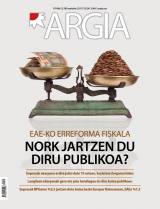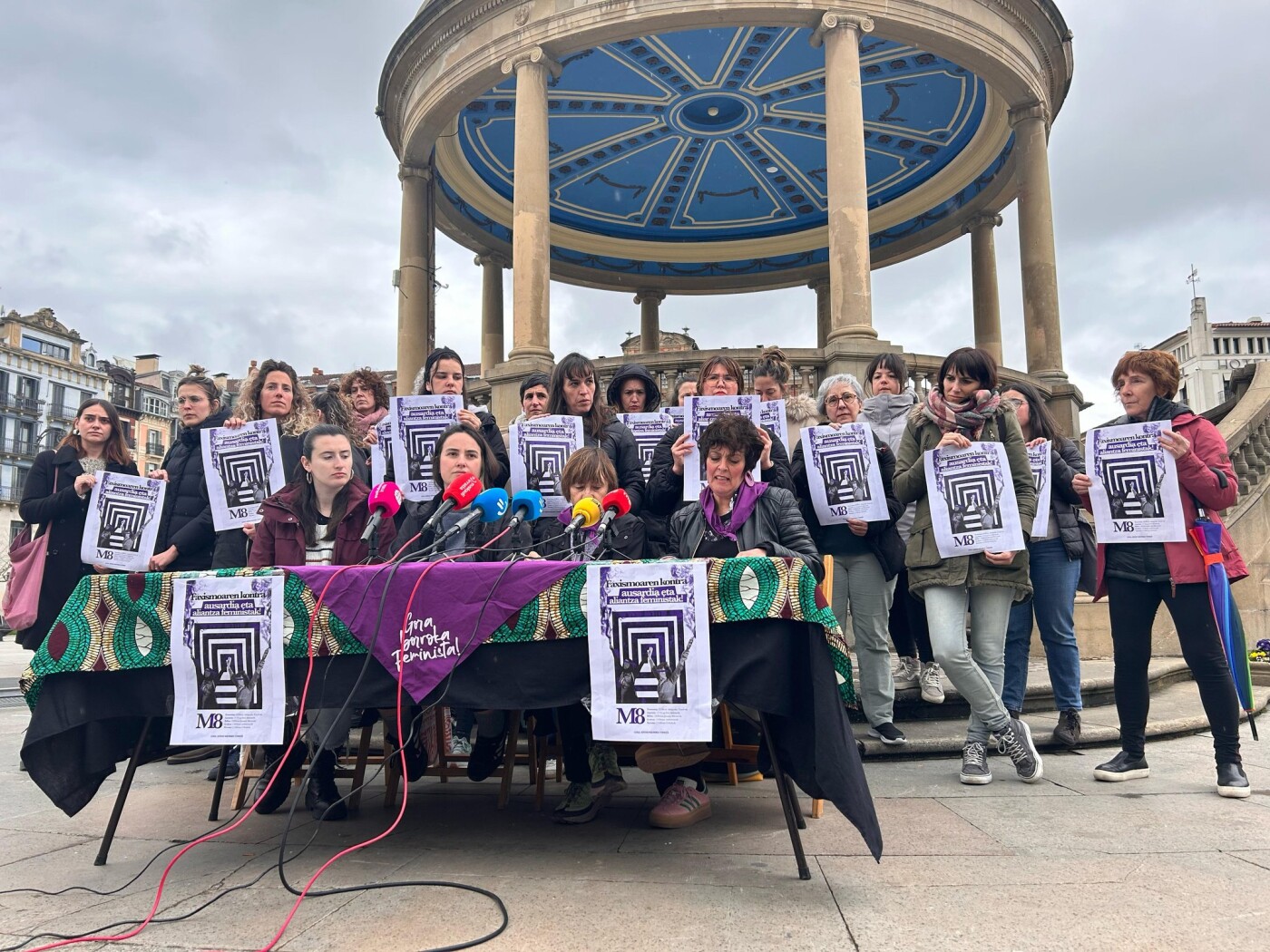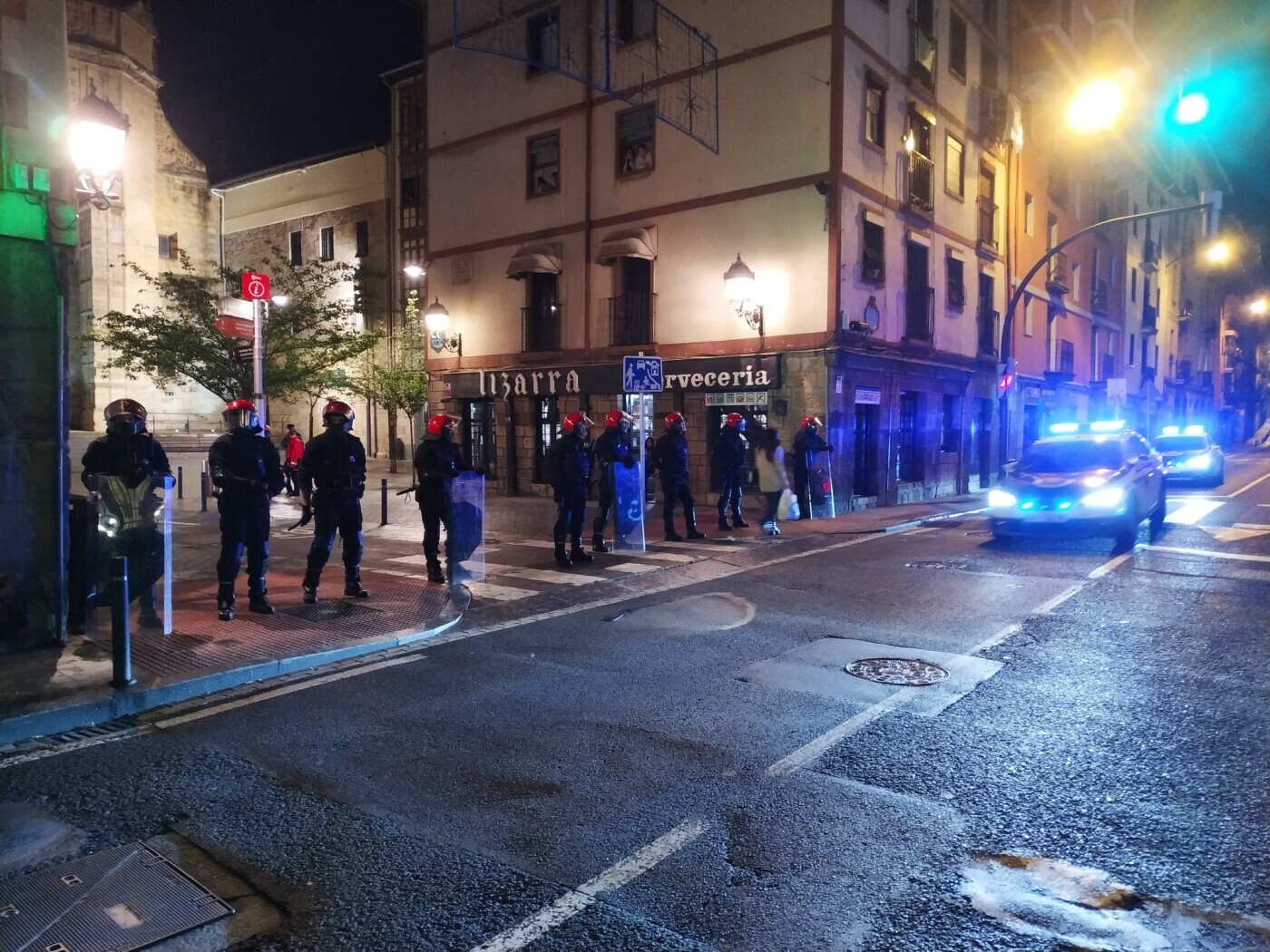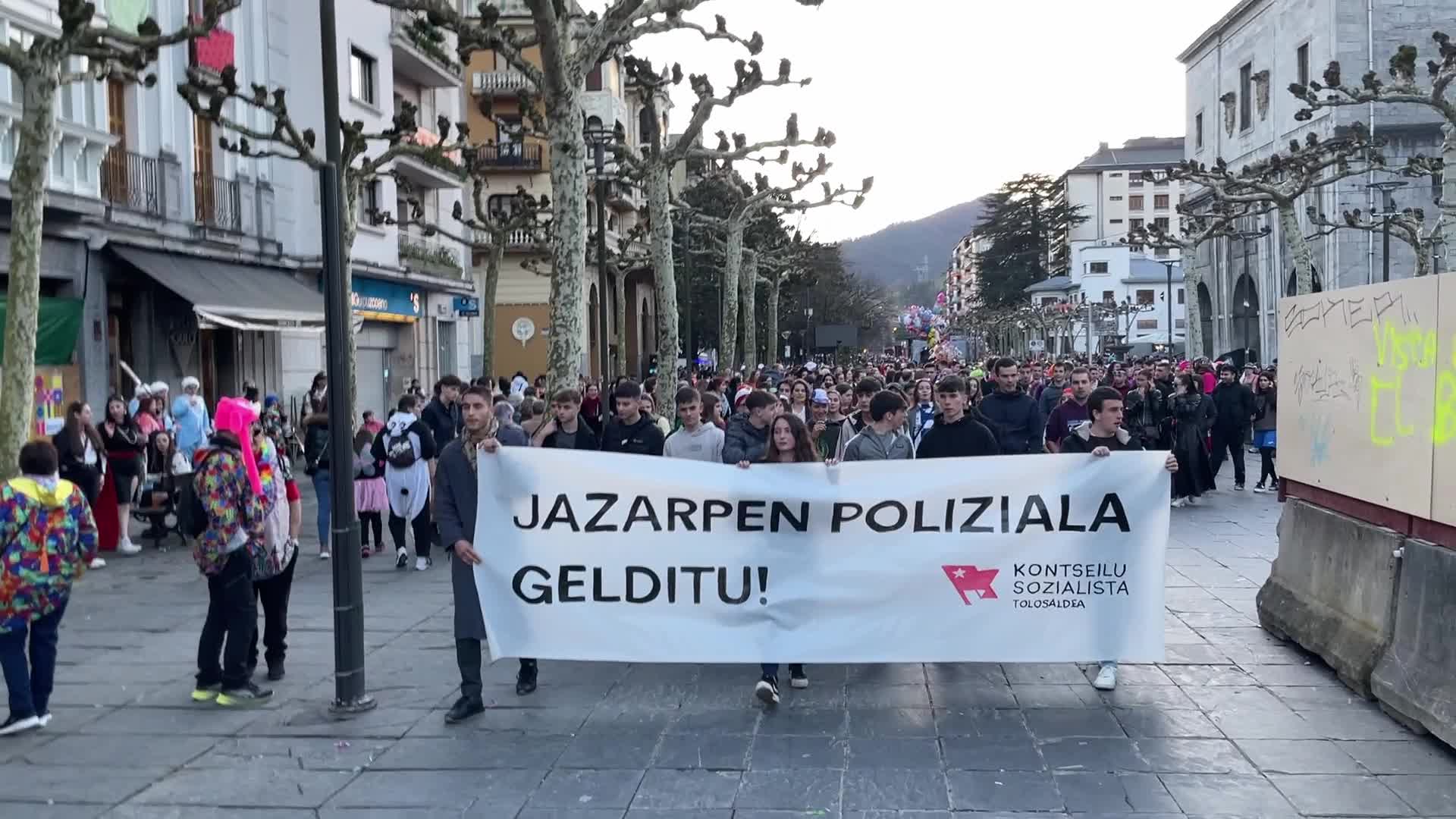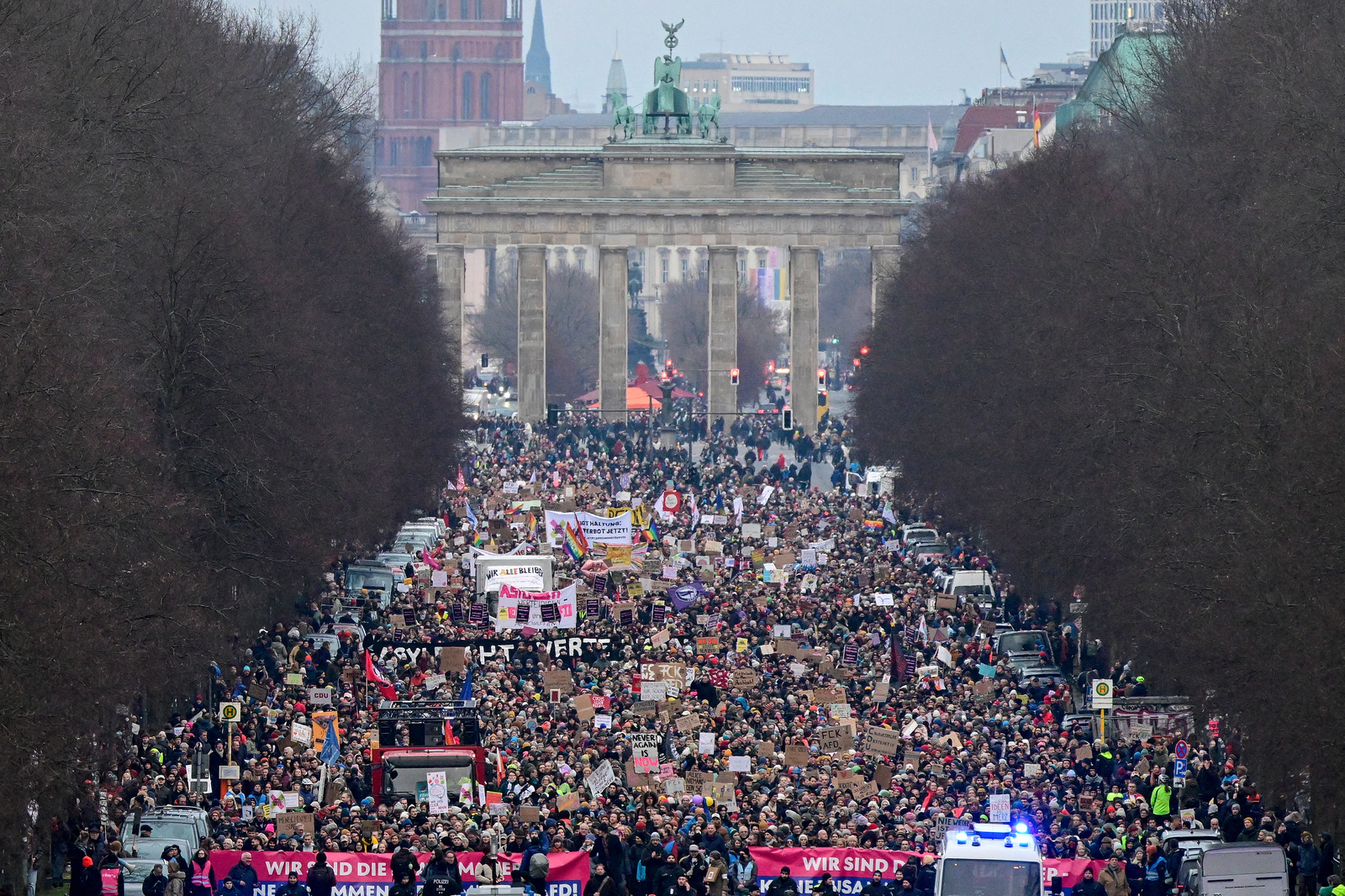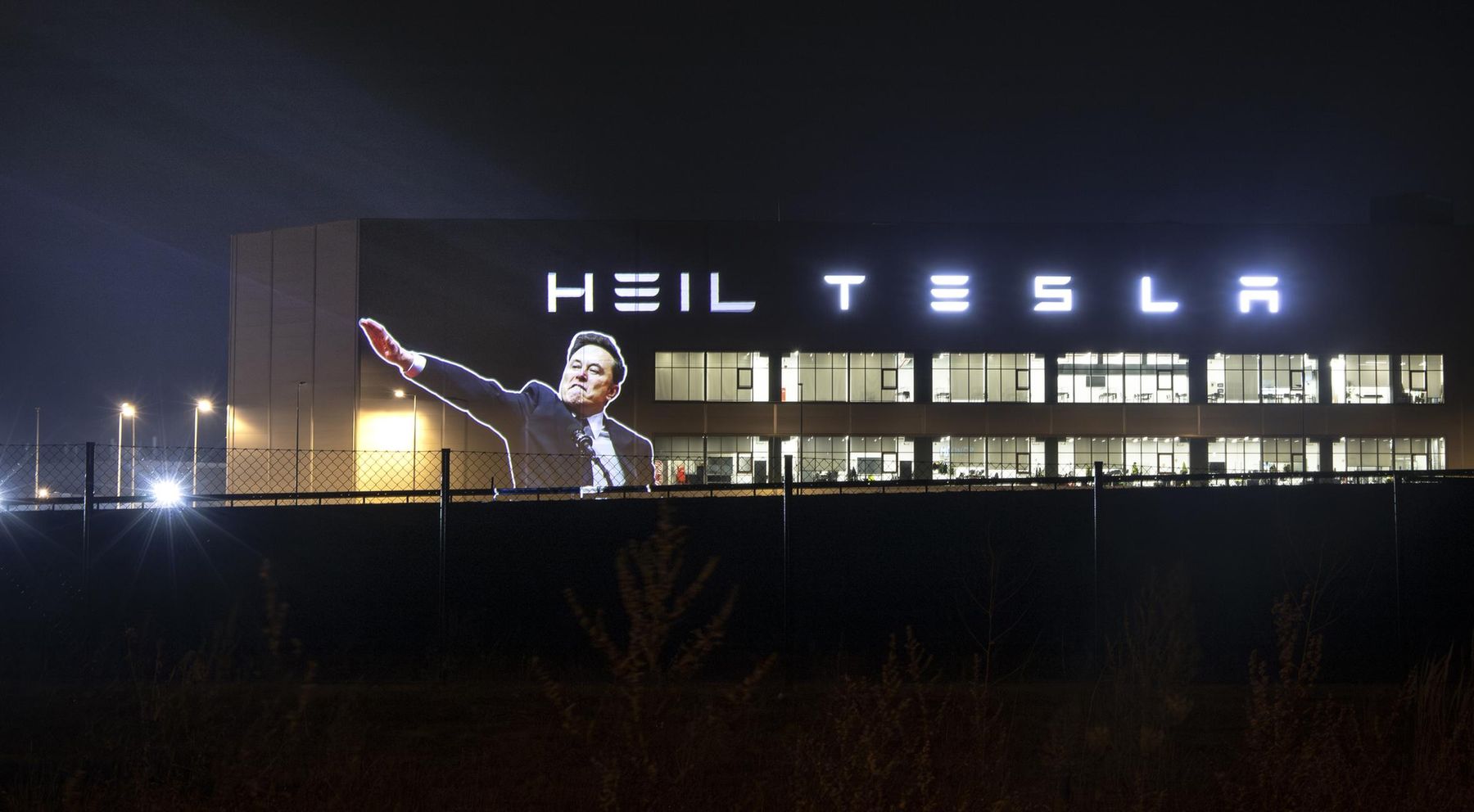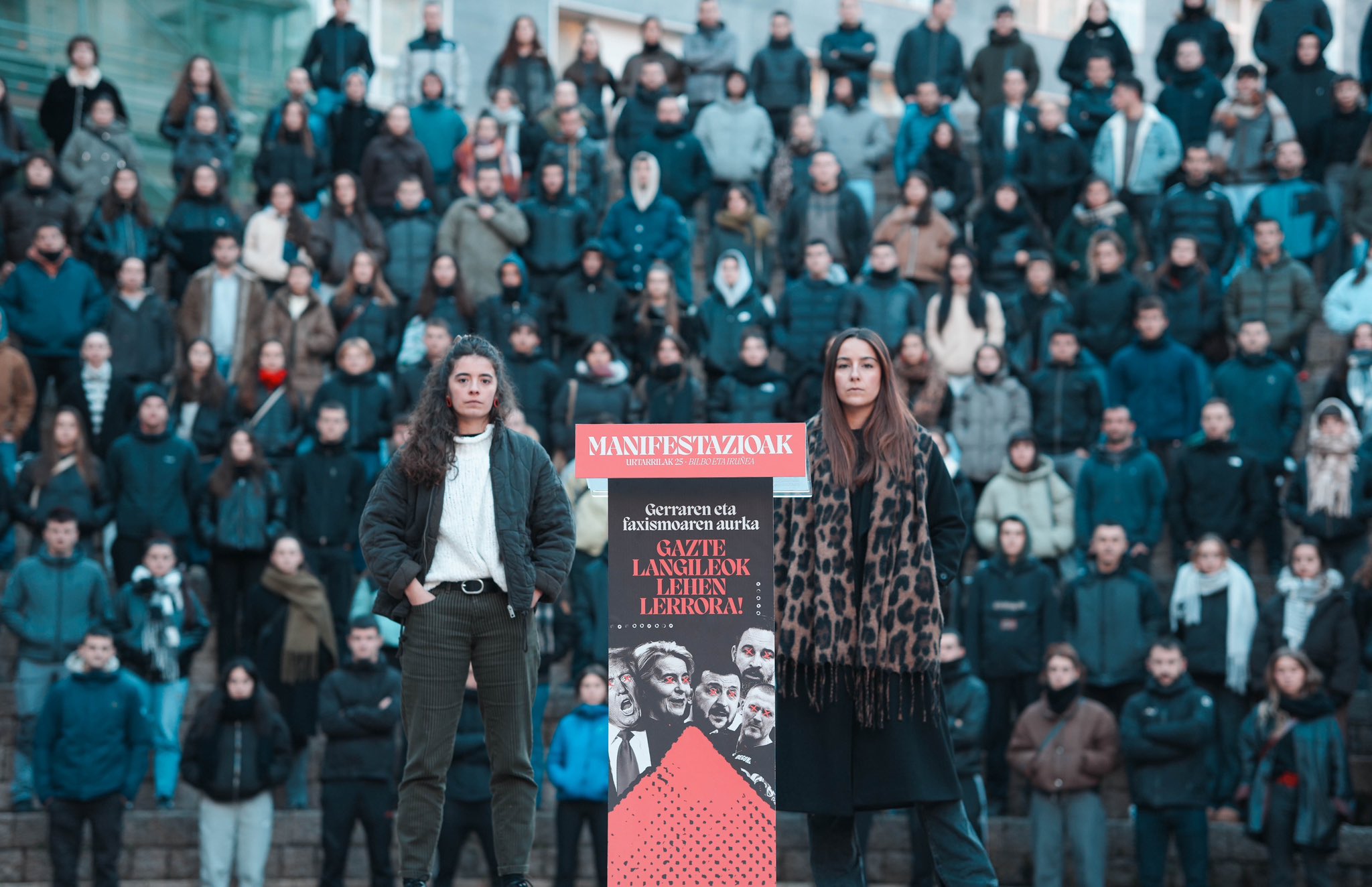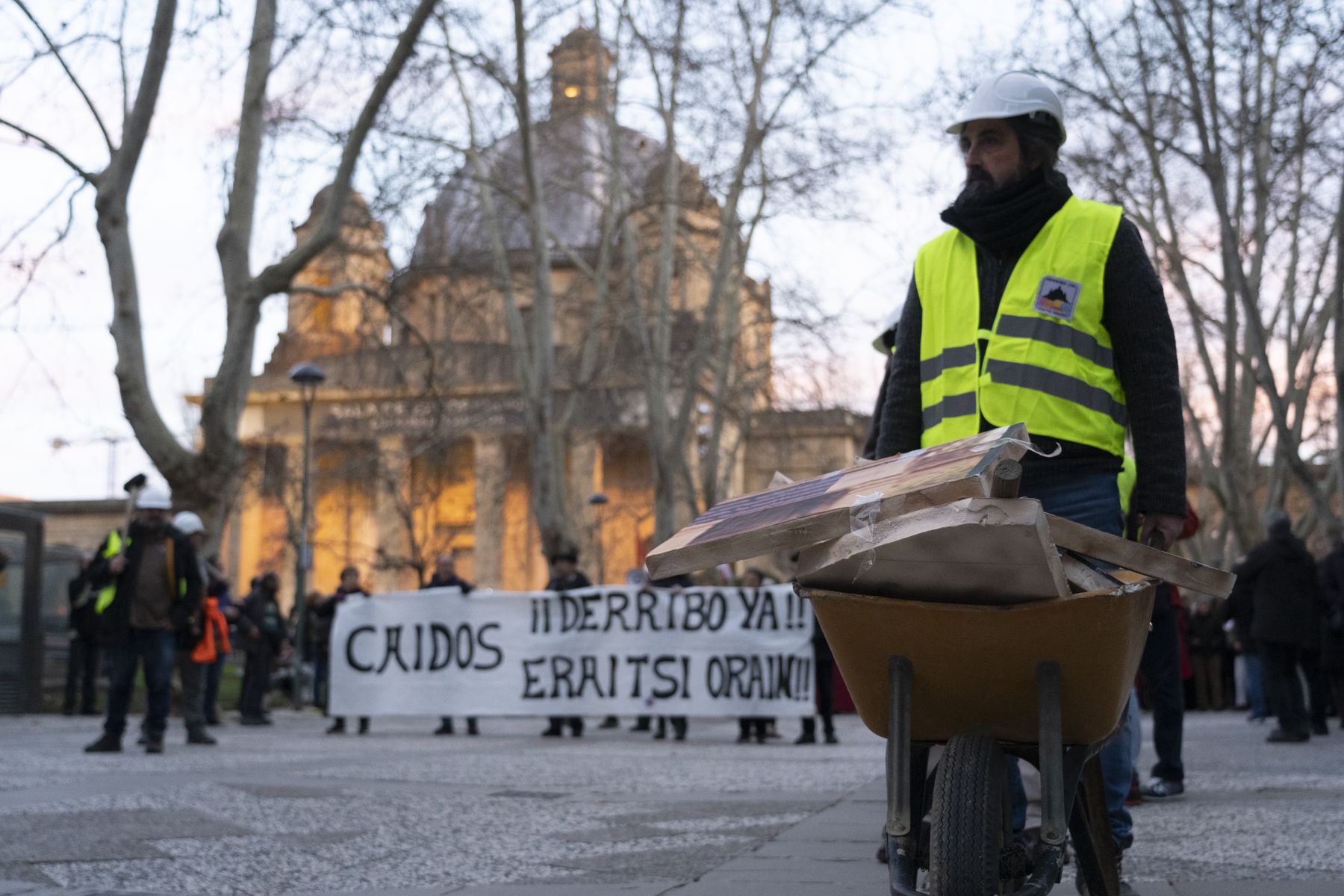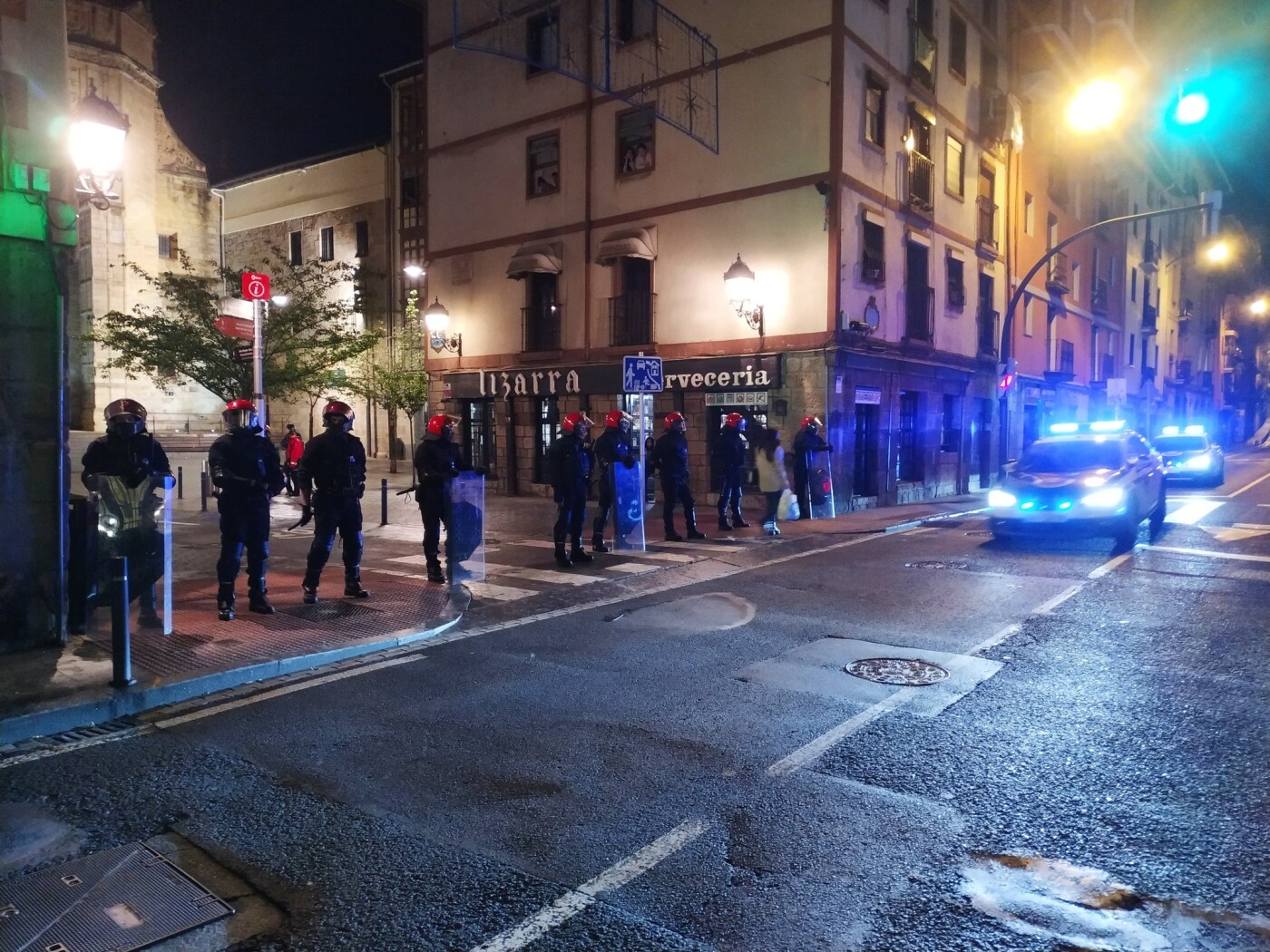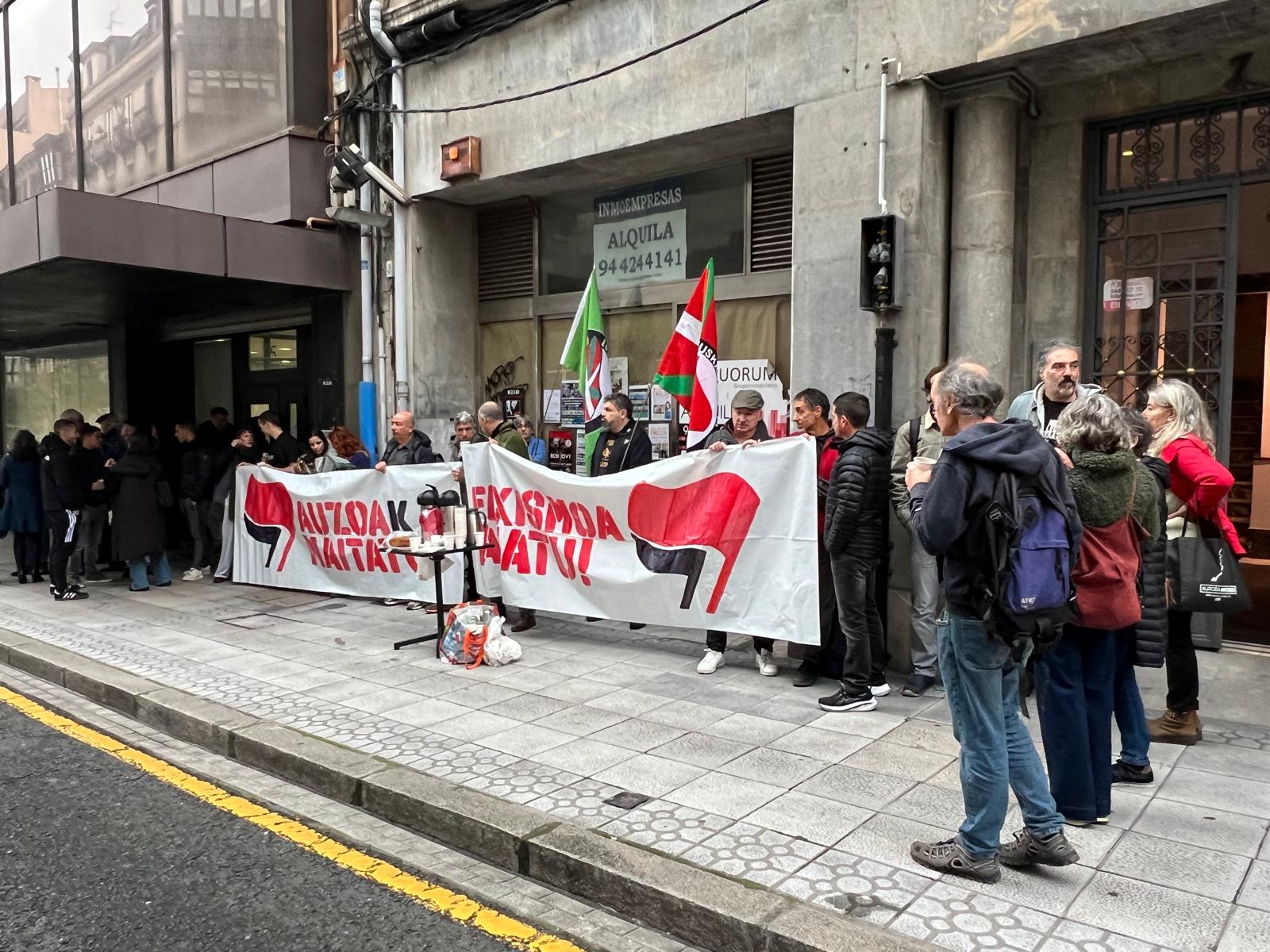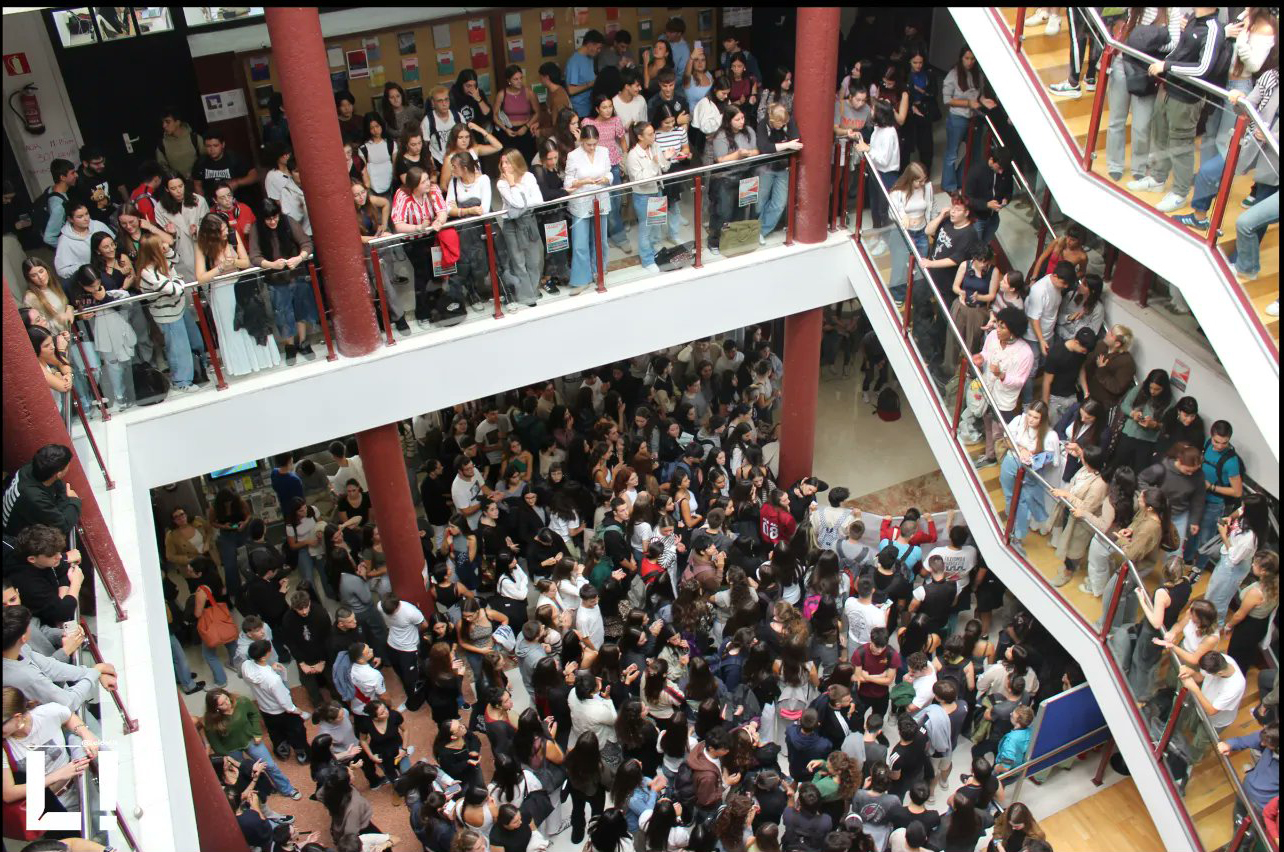Attempt to match the oppressed with the oppressor
- On 12 October 2013, six Catalan anti-fascists were charged with an alleged crime of aggression against some neo-Nazis in the framework of a police operation. The trial, which ended on 29 November, is awaiting what the court decides. The Public Prosecutor’s Office calls for a sentence of fifteen years in prison for each of the five defendants and four and a half years for the sixth. The defendants have denounced that they have been tried to "put the oppressor and the oppressor of eta on an equal footing." To make the situation known they have been in Euskal Herria and ARGIA has had the opportunity to speak with them.
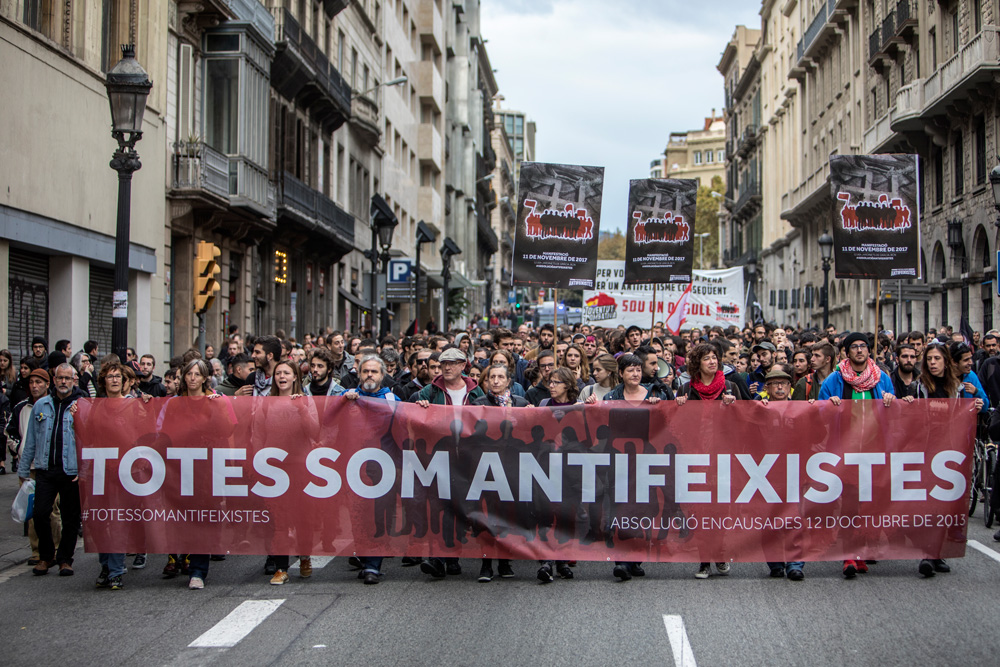
“To recover what has been taken away, to live collectively, to unlearn what has been learned,” the paper says on the door. We entered the “street school” of Tolosa. About 30 young people are in the interior, waiting for three from Catalonia to be told. Fèlix and Karim are charged with a fight that took place in Barcelona on 12 October 2013. Before the talk, “October 12. Culture of hatred and legitimate self-defense.”
The defendants have reported their history after performing the documentary Ciutat Morta in collaboration with the producer Metromuster, in which they also participated. In the audiovisual sector, the political character of 12 October is broken down. Among other things, they address the importance of racism in the construction of identities and the legitimacy of the different ways of dealing with fascism. “The documentary has come at the right political time, people feel it’s close,” says Fèlix. In the afternoon, we have had the opportunity to speak with the three members of Catalonia, who have explained the case from top to bottom.
From La Diada to Columbus Day
On October 12, 2013, on the occasion of the celebration of Columbus Day, thousands of Spaniards gathered in Barcelona. It wasn't the first time. Last year, after the first Diada independentista multitudinaria, far-right groups and associations of Spaniards organized acts in the Catalan capital. The leader of the Plaza de Cataluña got the support of Ciutadans, PSC and pp, among which are the fascist associations.
"The ultraderecha groups were already meeting in Barcelona on 12 October, but the 2012 was special for them. The concentration was organised together with other parties and groups, which gave it a more democratic aspect, to put it another way,” says Eva, a member of the support group of the victims.
Faced with the "success" achieved last year, 2013 again called for "filling up" Barcelona. Numerous Spanish extreme right-wing groups and parties organized buses to the Catalan capital. It wasn't a coincidence. A month earlier, on September 11, the Basque independentists carried out a giant human chain called Via Catalana.
“We will only accept acquittal, if we will not give them reason in this attempt to criminalize anti-fascism”
Responding to fascist threats
The documentary begins and the young people are attentive to what the subtitles will bring. Some neo-Nazis appear. With the Francoist flag on one hand and with the other, the Romans are being farewell. Yes, they are pictures of October 12.
As Columbus Day approached, threats began to rise on social media. Under the motto “We are Catalonia, we are Spain” they organized a concentration in the Plaza de Cataluña. The Spanish collective in March reconvened a demonstration from the Plaza de Sant Jaume to the Park of Montjuic. “The extreme right used to meet in Sants, but thanks to popular pressure we managed to send him to Montjuic,” said the defendant Fèlix.
The fascists toured the streets of the capital. “In these cases, countermeasures have always been organized in Barcelona,” says Fèlix. At 8 a.m. the antifascists gathered in the Sants neighborhood and headed to the University Square, next to the Plaza Catalunya, where the two calls were joined.
After the events, at 16:30 hours, there was a clash between neo-Nazis and anti-fascists in a bar in the Sants district of Barcelona. The fascists filed a complaint with the Mossos d'Esquadra for injuries sustained in the party. This complaint was taken over by the Prosecutor for Hate Crimes of Catalonia, Don Miguel Ángel Aguilar. For his alleged involvement in this fight, the defendant prosecuted six anti-fascists, including two men. Each of them was accused of three attacks and demanded a 15-year prison sentence. The defendants don't know what happened in Sants and don't want to talk about the fight they're being charged with.

Hate crime for anyone
In 2005, the Barcelona Audience created a prosecutor’s office to investigate hate crimes, and since then it has been Miguel Ángel Aguilar the prosecutor for hate crimes. According to Eva, it was created to deal with "the crimes of the extreme right", as its objective was to protect minorities. It was different to punish those who, being different, oppressed them. “But now it has become an instrument against a political position,” says Karim’s injunction.
Several citizens have been charged with a hate crime for protesting hotels where civil guards were present in many towns of Catalonia following the referendum on 1 October. Several teachers have also been charged for the alleged "indoctrination" of children in the schools of the Navarra locality. “A colleague is also charged with a hate crime for having committed an act of boycott against Israel in Valencia,” Eva explained.
“Hate crime starts to apply to everyone,” Karim said. The Prosecutor ' s Office, established to protect minorities, has begun to take action against these minorities.
Six anti-fascists were prosecuted for their alleged involvement in the fight and sentenced to 15 years in prison for each of them.
Spain in March, the wager of the extreme right
Other memorable images are projected on the front wall. This is the time when fascists enter an act of the Generalitat with their faces covered. They've taken the microphone off the speaker and they've launched their speech. But it wasn't just a crazy action by some fascists.
On 10 October 2013, the National Police arrested 12 people who broke into the Catalan government’s delegation in Madrid on 11 September to attack the attendees of the Diada. Falange, National Democracy and National Alliance entered the library of Blanquerna carrying symbols of fascist organizations. A month later, several of those who were going to file a complaint against six anti-fascists took part in the aggression, which took place in Madrid.
The Spanish extreme right had been working for months on a joint project, until then very fragmented. The first step was to present a sixteen point manifest in July 2013. Among the signatories were, among others, some of the groups that would later take part in the attack on Blanquerna.
An important date for the official submission of the platform was put on the table: 12 October 2013, in Barcelona. Four years later, however, in the trial against six anti-fascists for the events of that day, the police did not admit that it was a fascist act.
The concentrations were held on October 12, 2012 and 2013 in the Plaza de Cataluña, called by the association “Moviment de Espanya i Catalans”. Starting in 2012, however, “the far-right groups began to meet with the delegation of the Spanish Government, and agreed on a strategy to create a movement against independence, hence the emergence of the Somatemps association,” according to Karim.
“People quickly realized who were behind this movement,” as the people who gave their faces were members of fascist groups. “Over time, the face was washed and the Catalan Civil Society was founded,” Karim said.

Four-year fatigue
The documentary is over and the two accused and Eva are in front of everyone’s eyes. Fèlix begins to explain the case and Karim helps him. Karim says they have come to trial "tired" after more than four years, according to Karim. Félix is once again being held in prison, as he served one month in prison, after being arrested in 2014 by court order. The others were released on parole.
The arrests occurred in January 2014 and since then no demonstration or concentration has been allowed, being prohibited by the judge. “The Prosecutor’s Office has never banned fascist concentrations, while the six defendants have been banned from participating in concentrations and demonstrations for four years,” Eva said.
Citing the agreement, the answer is forceful, “we will only accept the acquittal, if we will not give them reason in this attempt to criminalize anti-fascism and that would create a precedent.” In addition, Karim added that he offered them an agreement, “six years in jail and denouncing his colleagues, of course, we do not accept it.”
“They wanted to show fascism and antifascism as two sides of the same coin, the two extremes”
Antifascism at the starting point
As often happens in these cases, one person has asked two or three questions for half an hour. He has also finished the question that a friend had started, which has caused laughter in the “school”, apparently, they know him well. One of the young people has asked about anti-fascism, which has caused obvious malaise among the young.
The defendants believe that what is at risk is the anti-fascist struggle itself, so they designed a campaign to join the anti-fascism: “We are all anti-fascists.” “They wanted to show fascism and antifascism as two sides of the same coin, the two extremes,” says Eva. Fèlix also makes it clear: “If there were no fascism there would be no need for antifascism.”
“I’m trying to criminalize the anti-fascist struggle,” Eva said. The defendants are accused of using violence, but Fèlix believes that it is not violence “but legitimate self-defense”. In the campaign they have worked several branches. “We have not used the word disproportionate because we are not going to accept any compromise decision, just absolution,” Eva added.
They have received broad support in the campaign, according to Karim, for example, he has received great solidarity in his homeland. “We have received the help of the closest ones, but other organizations and associations have also supported our campaign.”
They mention, among others, Sos Racism and Batasuna. The unit is a table of “broad ideological arc”. The platform, created to protest against the fascist party per Catalunya, extends from the agents who opted for the war in Iraq, through the CSP, to the anti-fascist assemblies of each place. The Catalan political context and the attitude of the PSC to this fact have led the party to the expulsion of the platform.
The General Secretary of Podemos, Pablo Iglesias, accused the independentists a few weeks ago of “helping to awaken fascism.” However, the declaration that led to the controversy in the Basque Parliament has a great political burden on Catalonia.
The fact that fascism has awakened shows that fascism is still alive on the foundations of the Spanish State. The questioning of these foundations has meant that the famous “for them” took to the streets of Catalonia with total impunity.
Kataluniako mugimendu antifaxistak bide baketsuen aldeko apustua egin du. “Autodefentsa jarrera alde batera utzi dugu egoerak hala eskatu digulako”, dio Karimek. Irrifar txikia du ahoan, eta prozesu horrek eragin dituen kontraesanak aipatu ditu. “Bide baketsuekin lortzen ari garena ikusita, biolentzia alde batera uztea erabaki dugu”, gehitu du Fèlixek, “Espainiako Estatuak nahi ez zuen erantzuna eman dugu, erantzun baketsua”.
“Urriaren 1aren bueltan jende asko politizatu da”, dio Karimek. Orain esperientzia antierrepresiboaren inguruan interes handia dagoela adierazi dute hirurek. “Polizia Nazionala eta Guardia Zibila polizia txarrak direla uste du jende askok, Esquadra Mossoak, ordea, onak, gure lana da erakustea guztiek erabiltzen dutela errepresioa” gaineratu du Evak. Ulertzen dute batzuek Esquadra Mossoekiko konplizitate hori izatea, irudi harrigarriak ikusteko parada izan baitute erreferendumaren harira, guardia zibilak eta Mossoak aurrez aurre jartzea adibidez.
Martxoak 8a heltzear da beste urtebetez, eta nahiz eta zenbaitek erabiltzen duten urtean behin beren irudia morez margotzeko soilik, feministek kaleak aldarriz betetzeko baliatzen dute egun seinalatu hau. 2020an, duela bost urte, milaka emakumek elkarrekin oihukatu zuten euren... [+]
Larunbatean pertsona talde batek Tolosaldeako Kontseilu Sozialistako kide bati eraso egin ziola salatu dute. Azaldu dutenez, "faxistei aurre" egin zien propaganda jartzen ari zirela, eta piperbeltz espraiarekin zipriztindu zuten.









